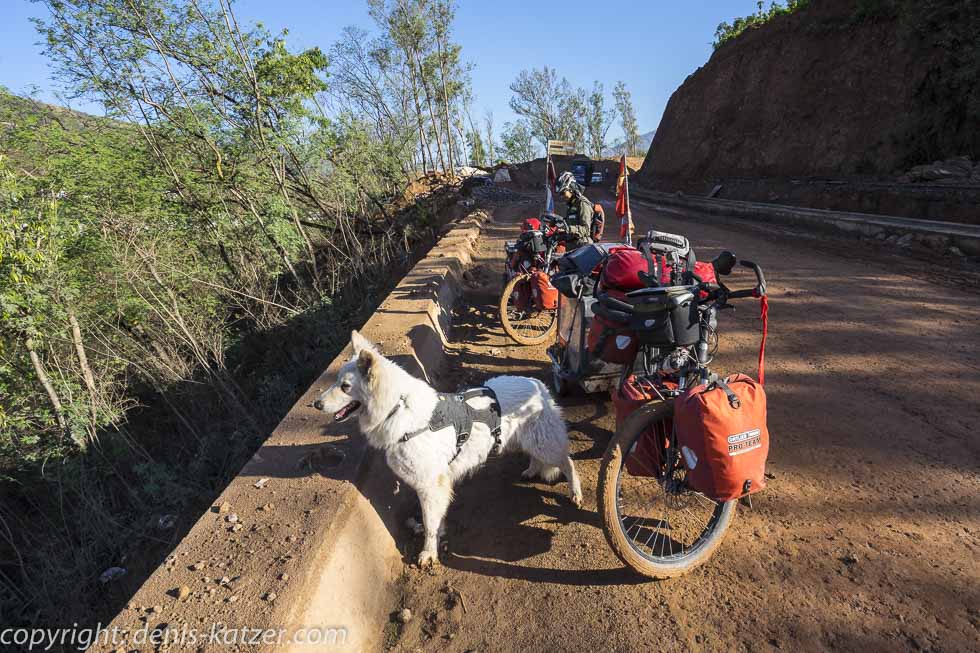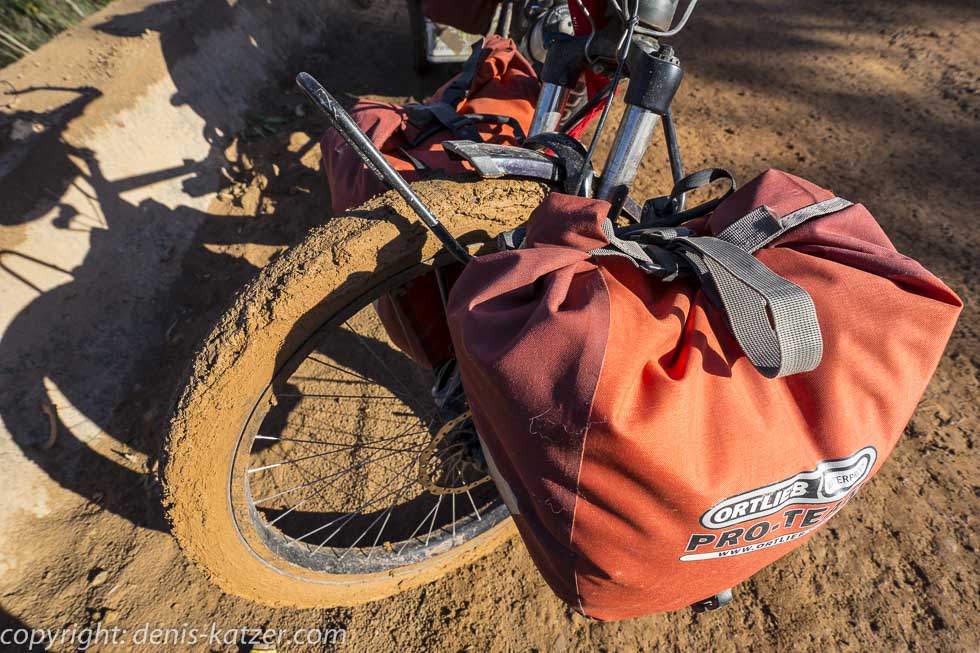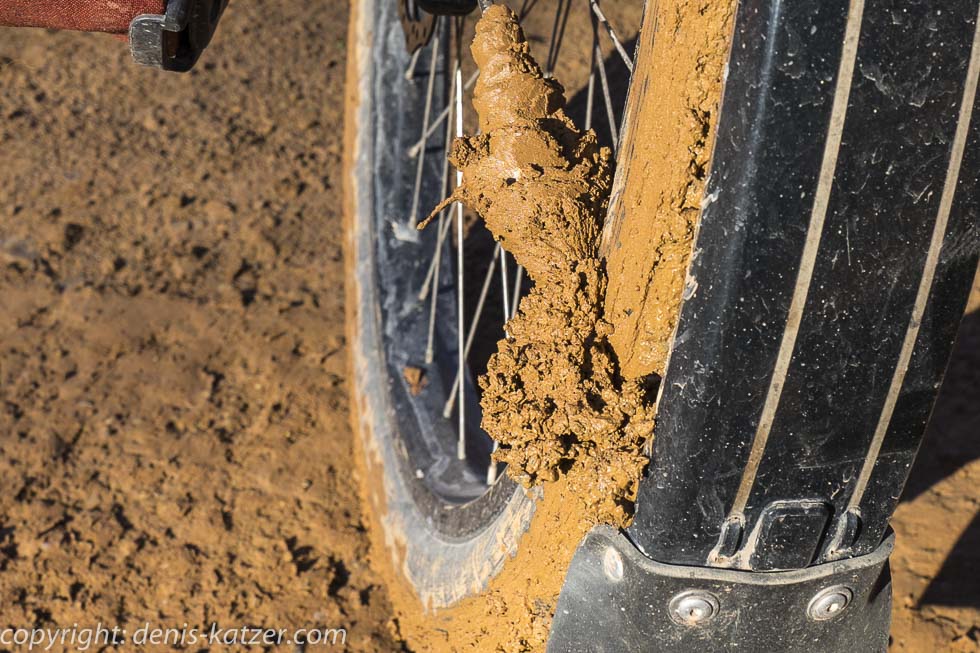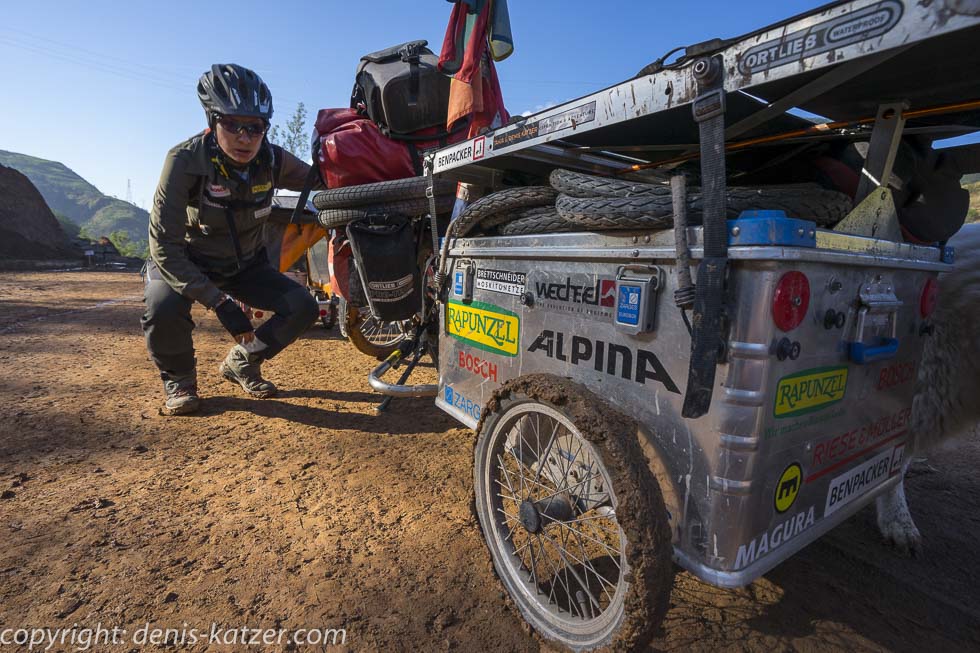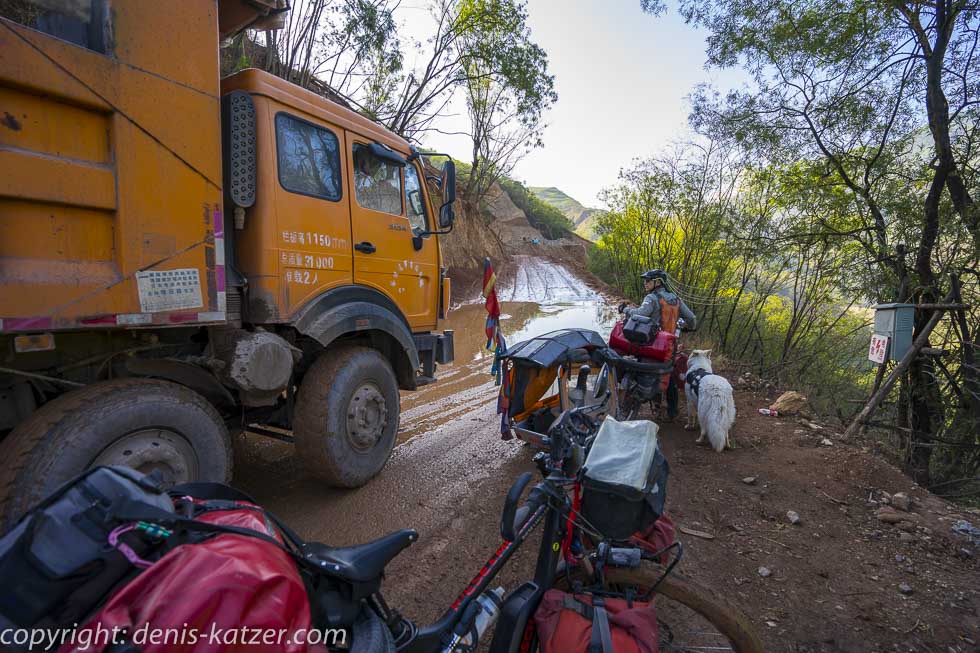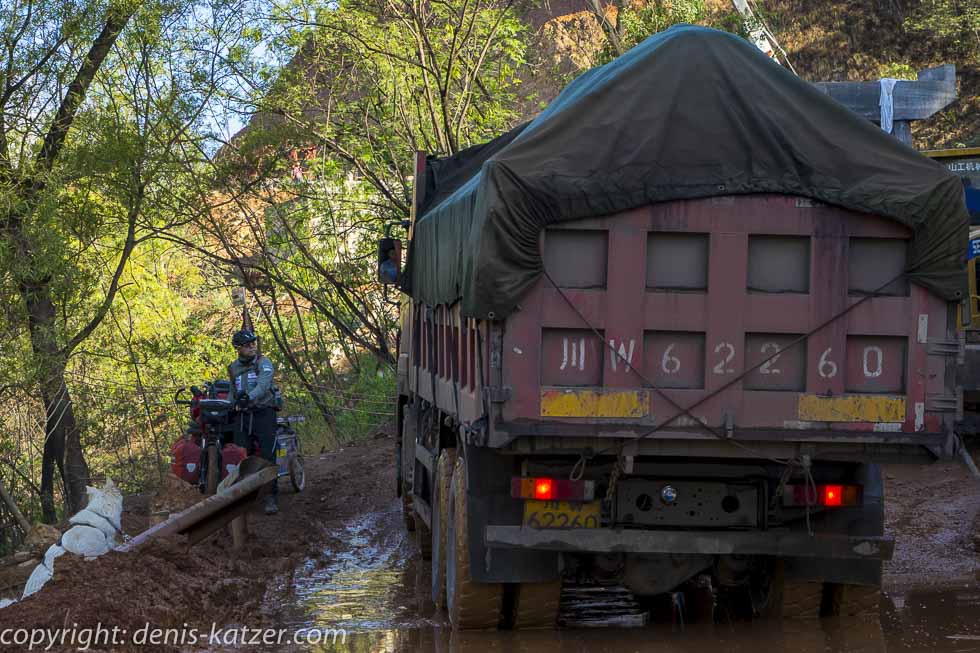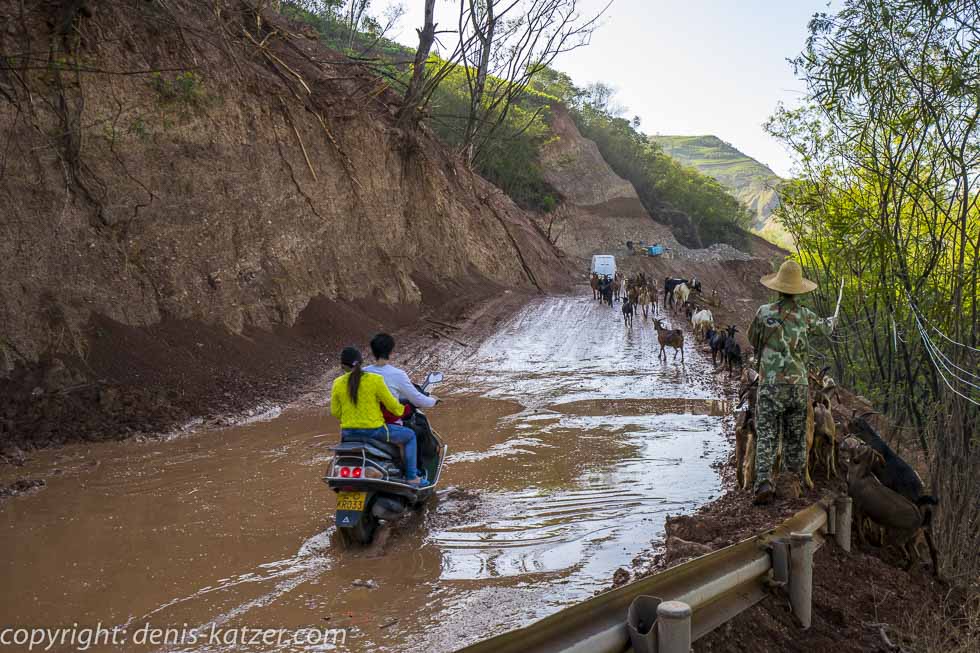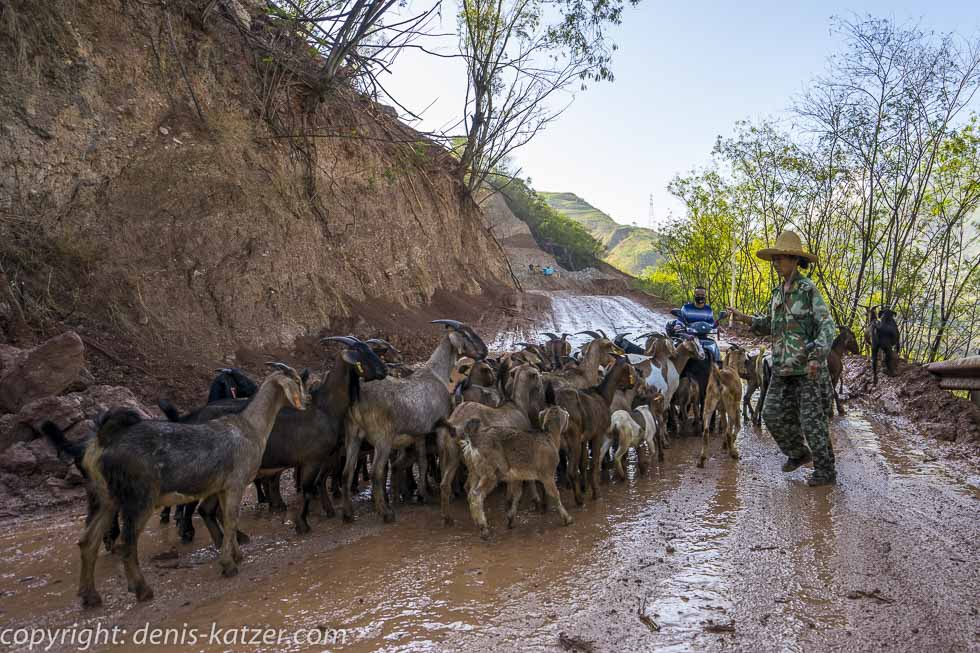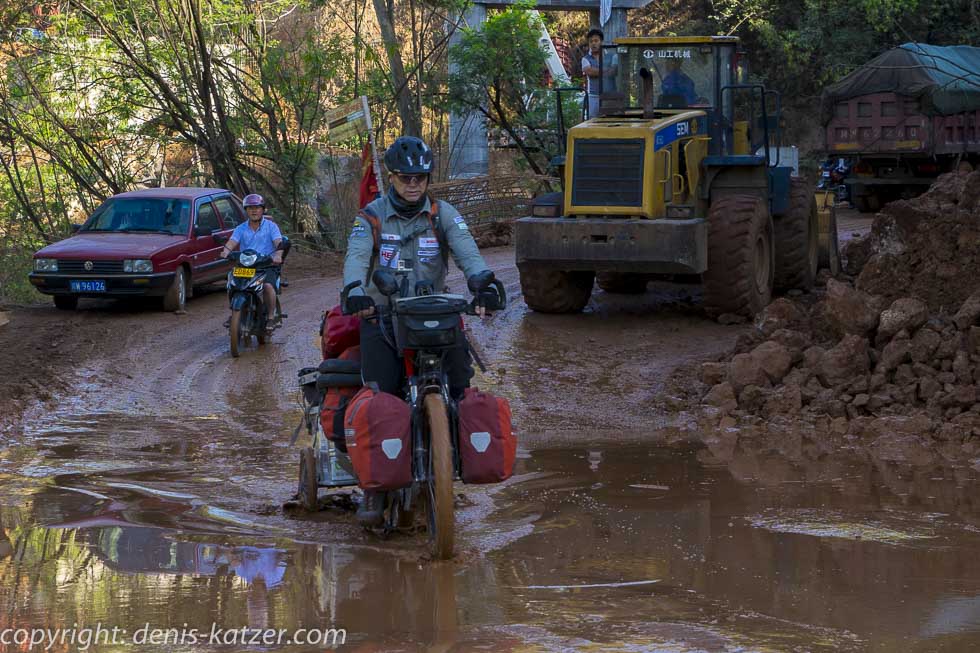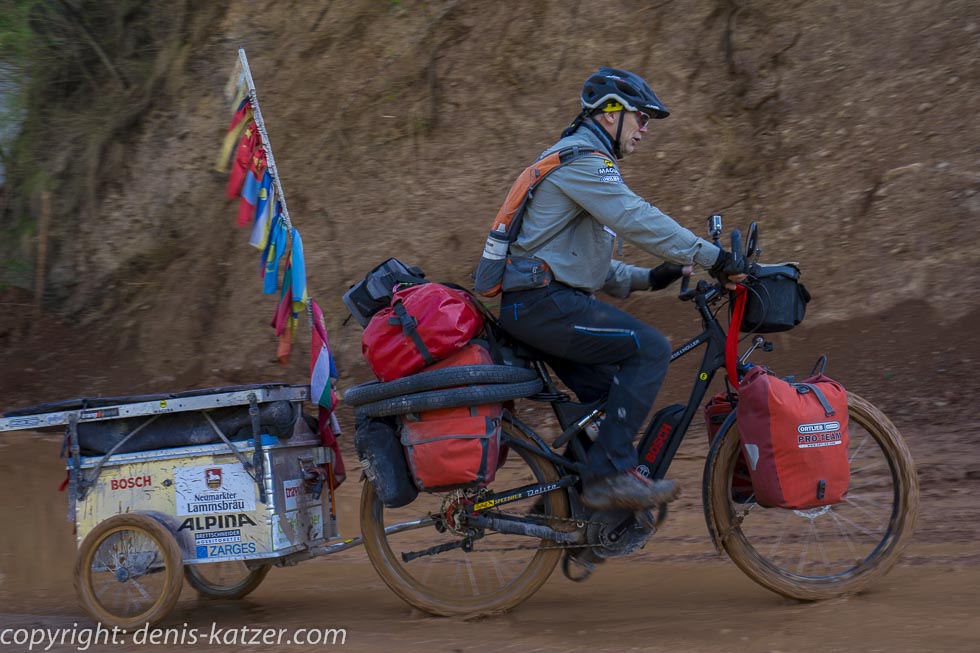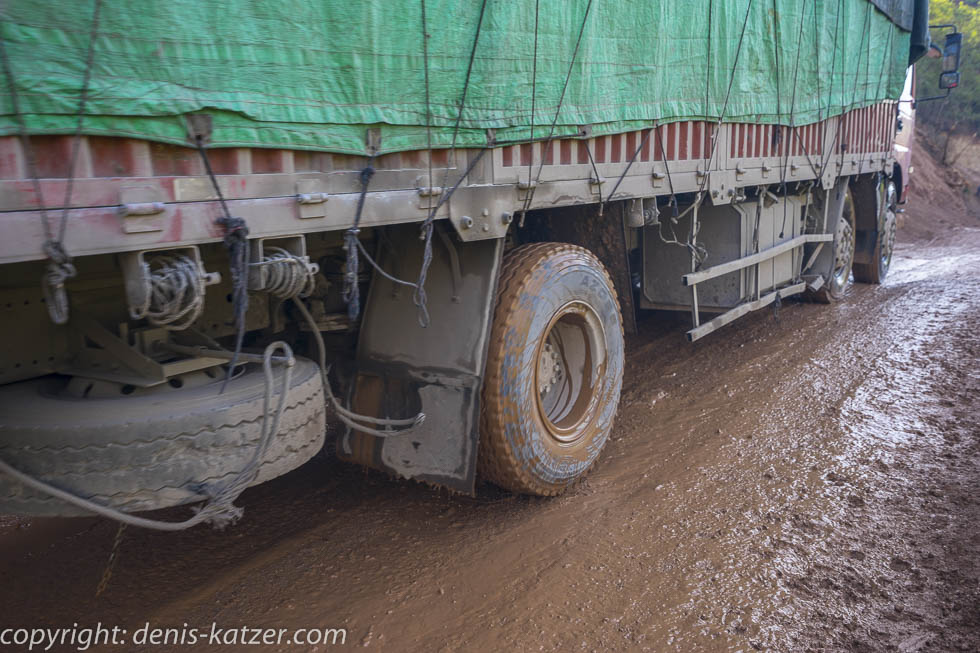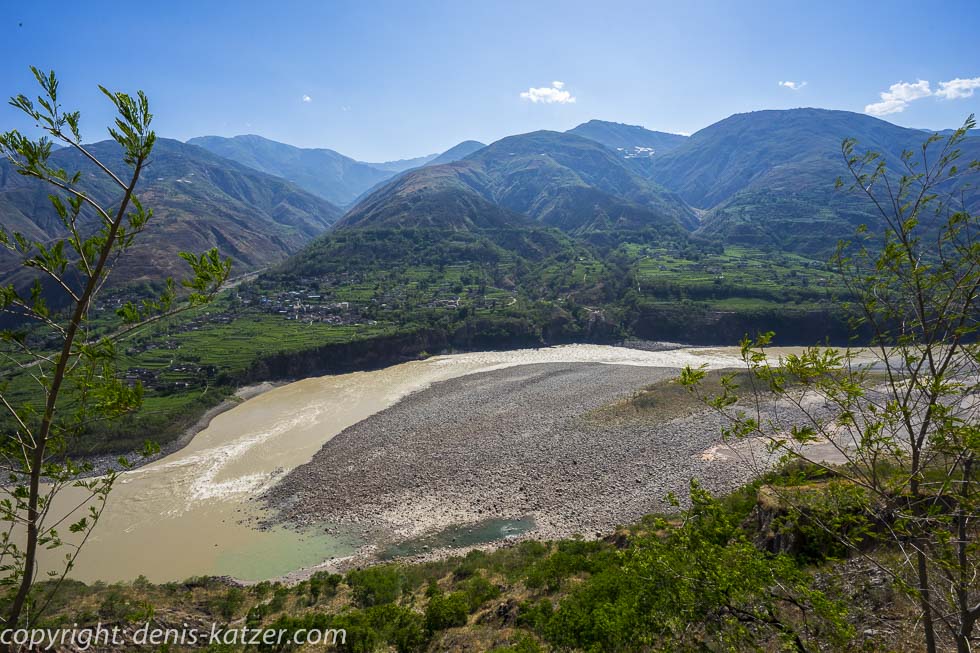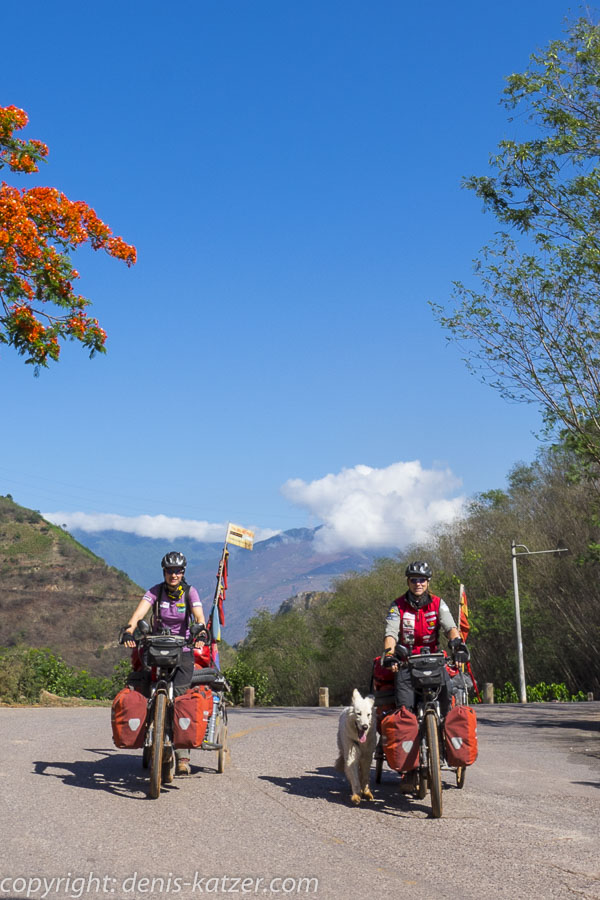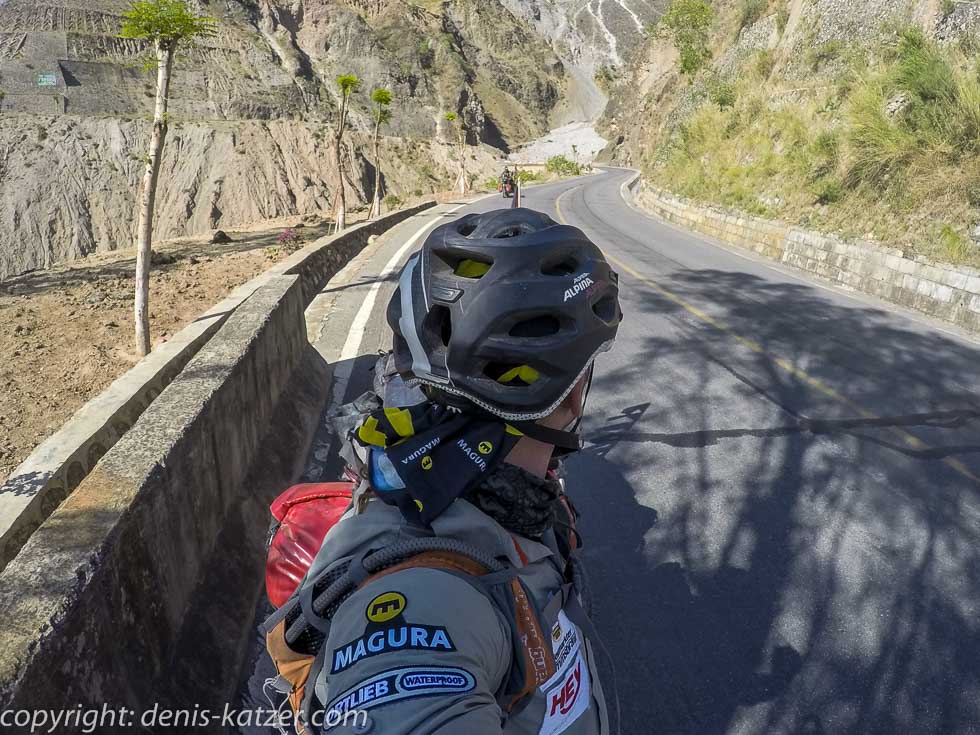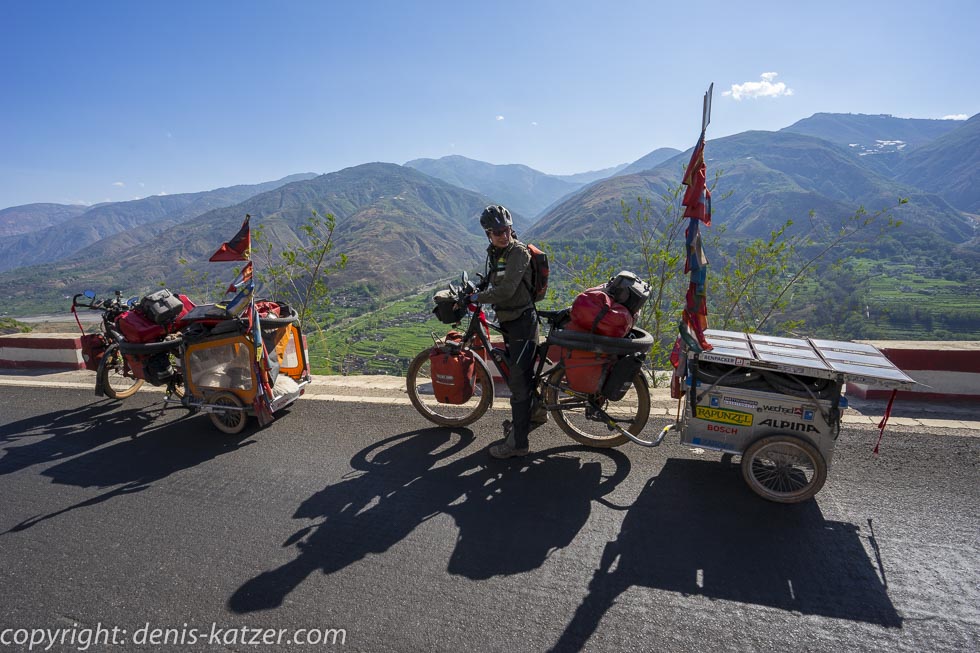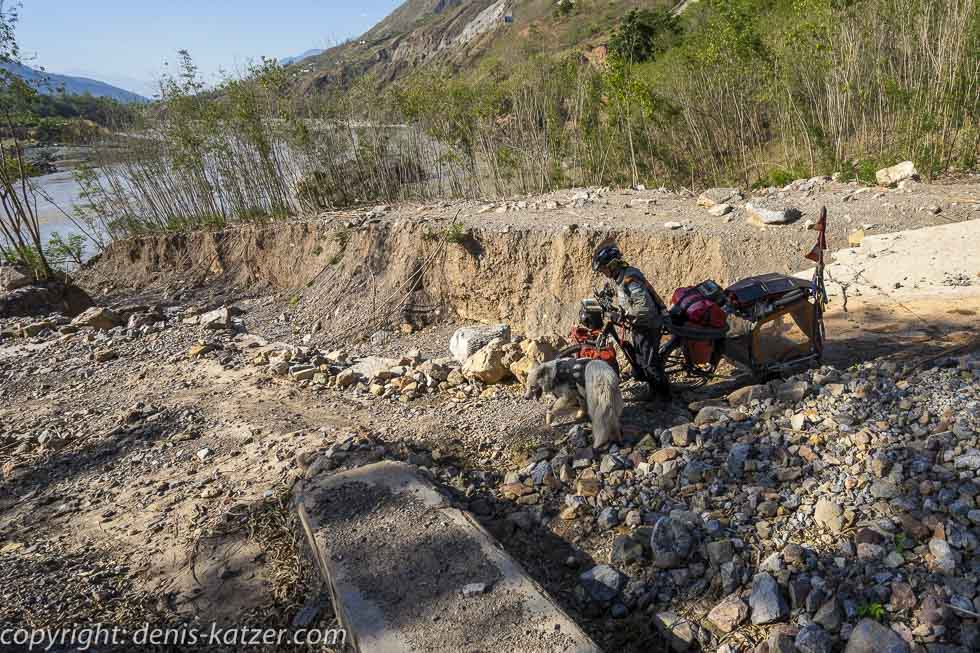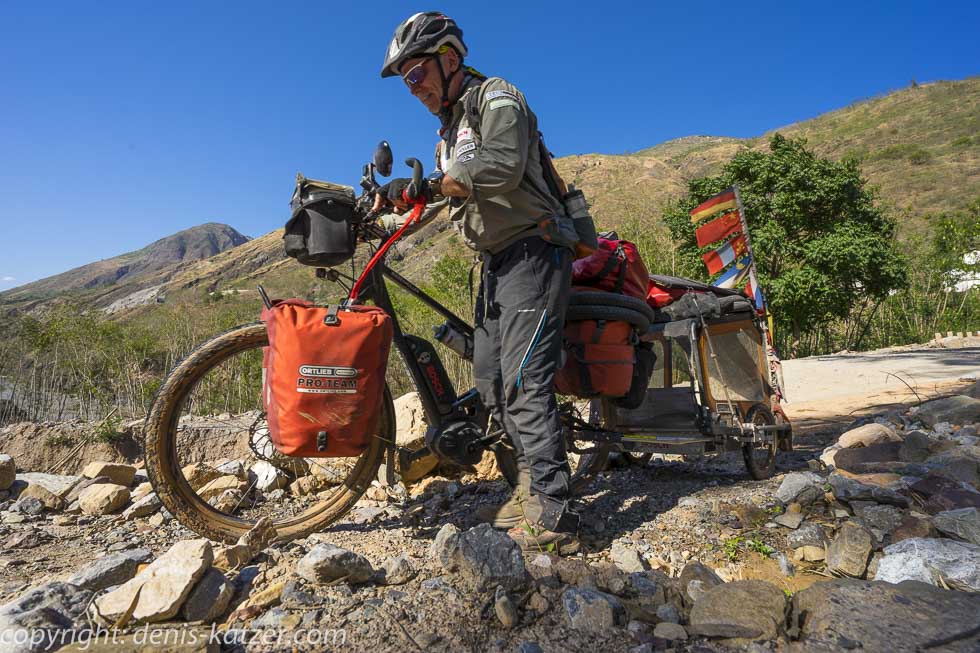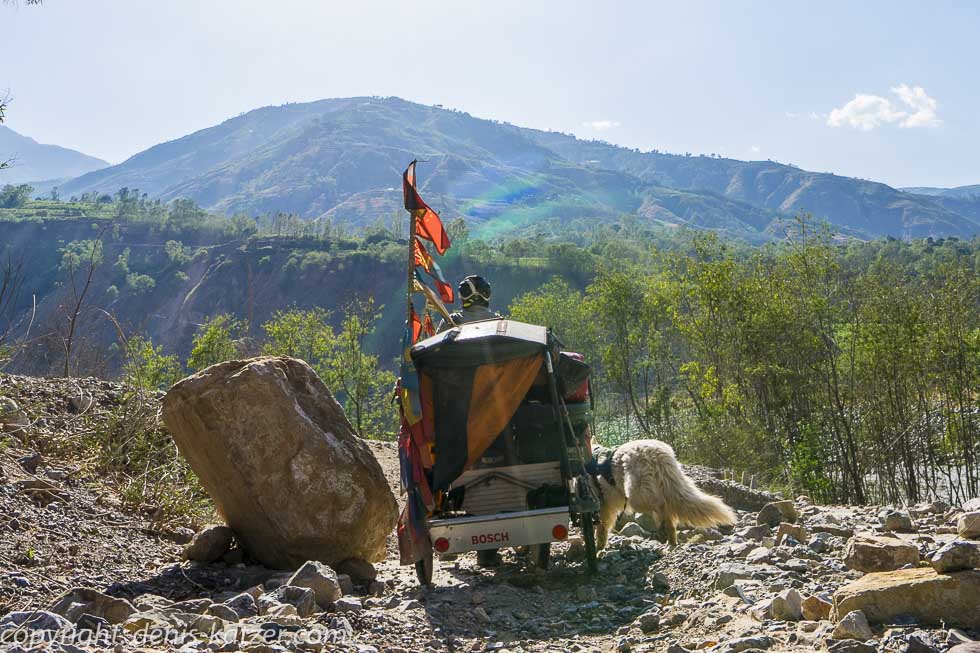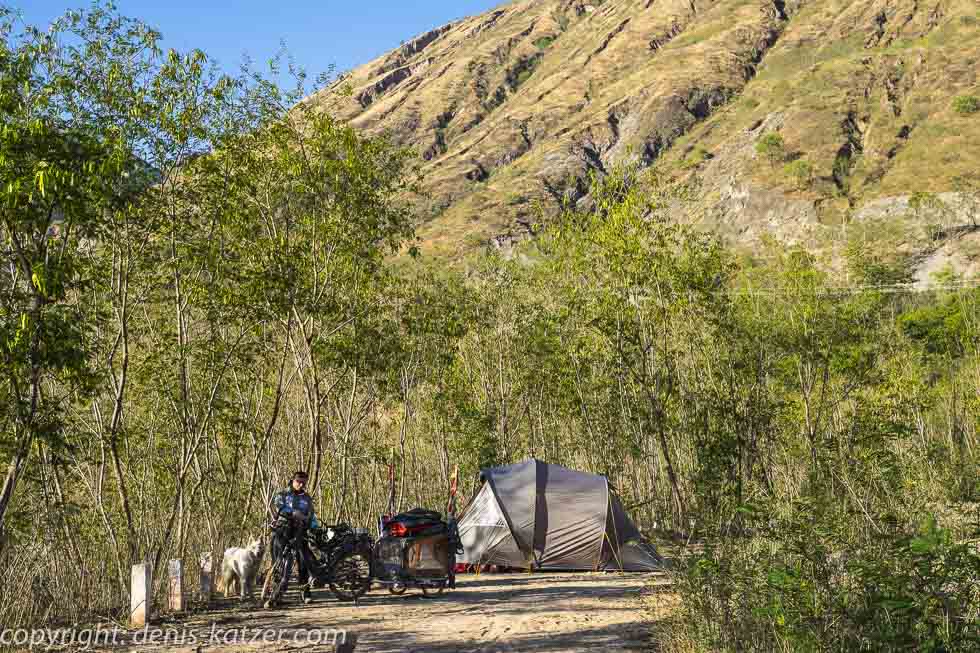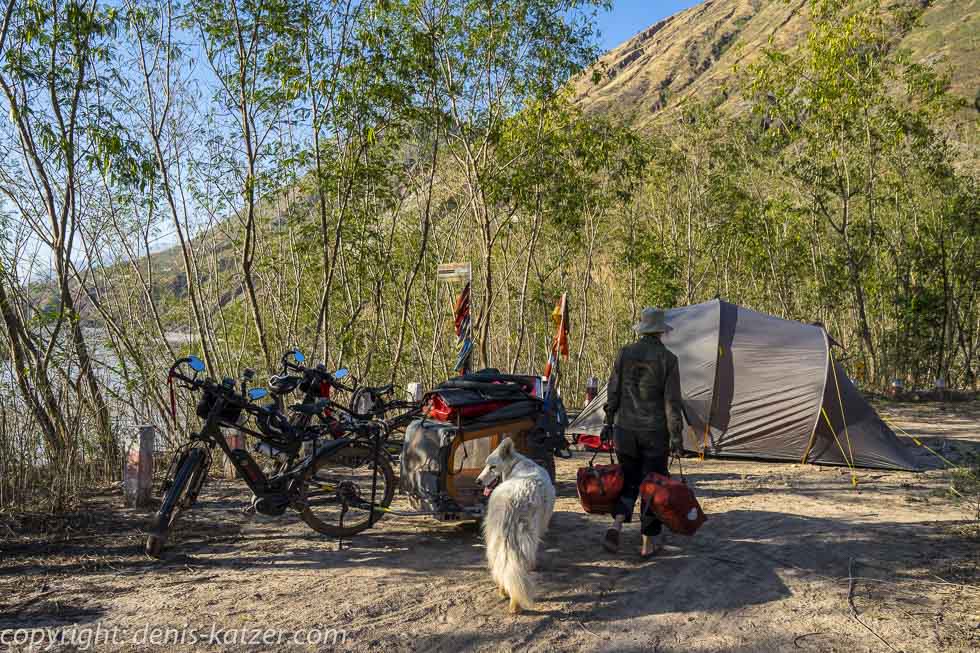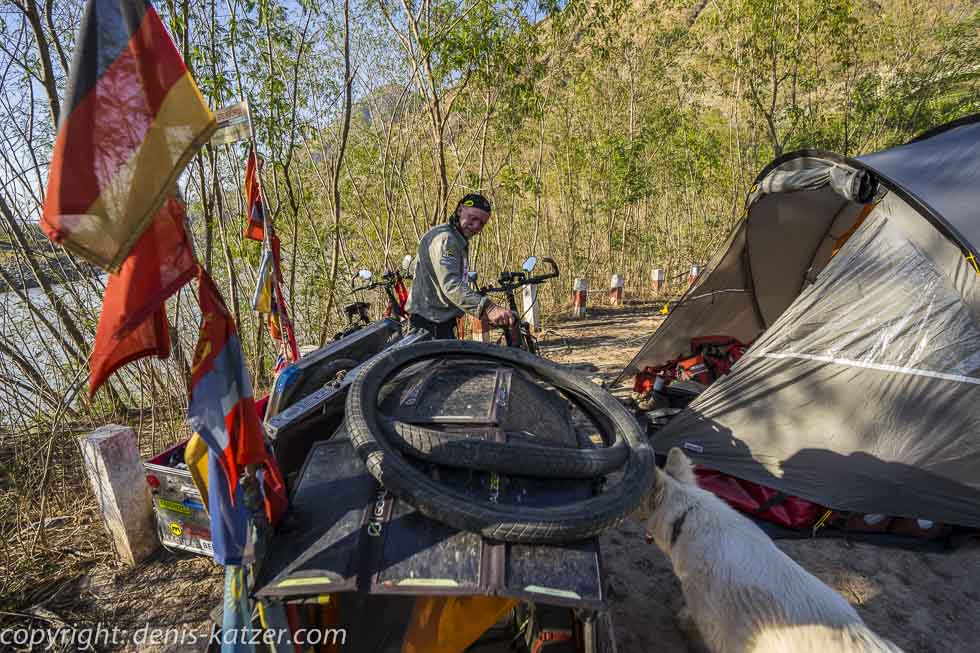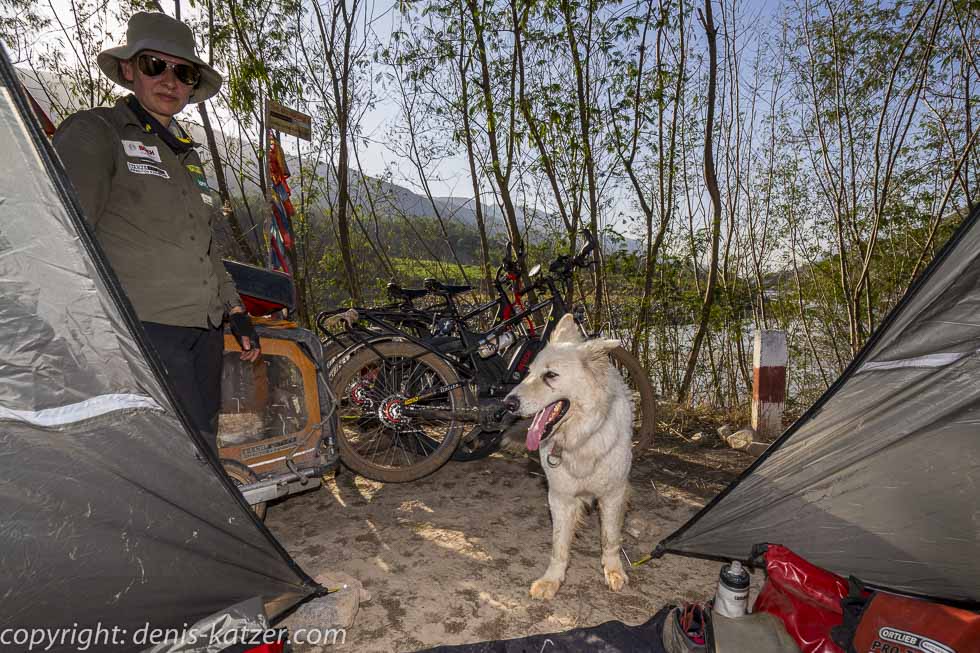
Mud holes, a heatwave and a nocturnal visit from the prospector
N 26°42'08.4'' E 103°00'31.9''
Date:
11.05.2016
Day: 319
Country:
China
Province:
Yunnan
Location:
River Camp
Latitude N:
26°42’08.4”
Longitude E:
103°00’31.9”
Daily kilometers:
60 km
Total kilometers:
16,709 km
As the crow flies:
48 km
Average speed:
17.7 km/h
Maximum speed:
56.6 km/h
Travel time:
03:22 hrs.
Soil condition:
Clay slope / asphalt
Maximum height:
1.500
Total altitude meters:
35.170 m
Altitude meters for the day:
925 m
Sunrise:
06:23 a.m.
Sunset:
7:45 pm
Temperature day max:
38°C
Temperature Day Sun:
65° C
Temperature day min:
25°C
Departure:
07:40 a.m.
Arrival time:
5:20 pm
(Photos of the diary entry can be found at the end of the text).
In the shadow of the high mountains, we let our bikes roll the first three kilometers into the valley of the Heshui River. “It’s going to be a beautiful day!” I cheer as the asphalt is suddenly replaced by a potholed clay track. Due to yesterday’s storm and heavy rain, the surface is slippery and dangerously slippery. “Watch out!”, I warn Tanja, because my bike starts to lurch despite my walking speed and I can only avoid a fall by jumping out of the saddle and skidding over the slippery clay with both feet. The yellow, sticky mud immediately settles into the treads and turns the tires into slicks after just a few meters. “I can’t get down there!” Tanja calls out to me. “Wait up there. I’ll help you,” I reply, look for a place where the stand won’t sink into the soggy mud and hurry back up the muddy slope. I now carefully let Tanja’s bike train roll down the slippery ground a hundred meters. Panting heavily, I rest for a few minutes. Then I push my bike another hundred meters forward. In this grueling way, we work our way meter by meter over what will eventually become a road. Heavily laden construction trucks cough past us and push us to the edge of the slope. In some places, the pass road under construction only has one lane. I look at Tanja’s face and recognize doubts, doubts as to how we are supposed to make the 700 km to the border in this way. Especially whether our bikes will survive such a violent tour. “You want to go to Kunming? And on this route. Good luck then,” said a Chinese motorcyclist a few days ago. Due to the lack of language skills, we only now know what he meant by that. The moped riders coming towards us are splattered with yellow mud. An observation that does not give us courage. Suddenly we are stopped by a ten-meter-long expanse of water that stretches from the right to the left edge of the slope without a gap. “How are we supposed to get over this?” asks Tanja. “Drive through,” I reply. “But you don’t know how deep the water is.” “We’ll wait until a moped arrives. Then we’ll know where we can cross the small lake.” It doesn’t take long before a 38-ton truck honks loudly at us and forces us to push our bikes a few centimeters to the side. The large, dirt-covered tires smack past us. Then a moped rider follows. He lifts his feet and finds the ideal route. As I set off to follow him, I am stopped by a herd of goats. The shepherdess drives them through the muddy broth at the edge of the mud hole. “Watch out!” warns Tanja as I steer my bike through the hole in second gear. In the middle of the treacherous sludge, the tires start to spin. “Just don’t stop pedaling,” it goes through my head, then the sloshing obstacle is already behind me and my steed lurches up the other side. 20 minutes later, we continue our journey. The section of road under construction continues for another five kilometers, then we are rewarded with hard bitumen.
Relieved to have left the piste behind for the time being, the tires roll over the pass road kilometer by kilometer. Trees in full bloom line the path and quickly make you forget the morning’s exertions. The Jinsha River, which we already followed 300 kilometers ago, turns into the longest river in China a few hundred kilometers downstream and is called the Jangtsekiang, winds along the mountain road again. We enjoy the ride through the picturesque river valley until it gets hotter and hotter. Around midday, the thermometer rises to 38 degrees in the shade. We’re sweating like monkeys, not yet used to the extreme heat after the long winter. My thermometer shows 65 degrees in the sun. As there is no shade on the road, these are the real temperatures that will soon make today unbearable for us. Nevertheless, we work our way across the black asphalt, which reflects the merciless rays of the sun like a mirror. As the road repeatedly climbs for 100 or 200 meters, we climb 1,000 metres over the next 50 kilometers. “I need a break!” Tanja calls behind me. I stop in the tiny shade of a poplar tree. “We have to keep going,” I say after 10 minutes, because we are still a long way from reaching our destination for the day. Street vendors sell fresh mangoes. We enjoy the sweet flesh. At 13:00 we pass through a village whose inhabitants are suffering from the unexpected early heat as much as we are. In the corner of my eye, I spot a small roadside restaurant. We park our bikes and sit down in front of the simple building. A corrugated iron roof protects us from the sun’s rays. As we don’t know where to find accommodation today, we take the opportunity to charge four of our Bosch batteries. Our bodies cool down a little during the meal. “Phew, I feel like I’m exhausted. I’d love to lie down here on the concrete floor and sleep,” says Tanja. “I feel the same way,” I assure her.
2 ½ hours later, we start pedaling again. The late afternoon sun feels even hotter. No breeze blows through the valley of the Jinsha River, whose brownish-yellow water winds its way about a hundred meters below us. As I’ve been looking for a place to pitch our tent for some time, a suitable spot on the banks of the river catches my eye. “Should we go down there?” I ask Tanja. “It’s a damn steep descent,” she points out. “I’ll check it out,” I say, putting my bike on the stand and following the narrow concrete strip. “Looks good,” I say 15 minutes later. We carefully let our bikes roll down into the depths. A few hundred meters further on, behind a bend, the concrete is replaced by rubble and stones. A heavy thunderstorm caused a nearby mountain stream to flow over the path, completely destroying the man-made concrete strip. “And now?” asks Tanja. “Hm, if we’re careful we can still go down.” “Are you crazy? I’m not going to ride a 150 kilogram bike over a gravel and scree strip,” she says reproachfully. “I’ll do it for you,” I reply, because I’m dreading turning back and the camp site I’ve spotted can’t be far away. With great effort and like an acrobat, I let my bike roll on. It bumps and crashes. The rear and front tires slip under the weight of the load over dry, hot sand. I almost lose my balance once, but manage to catch the bike at the last second. “What are you doing here anyway? Why am I risking my health and my technology for a camping spot?” I think to myself, but I can already see the small uncovered area that I had discovered from the road. Then, suddenly, the scree path ends. The former mountain stream simply swept it away. A broken concrete slab, once part of the man-made path, juts accusingly into the air. The other half lies two meters below me in a stream bed. I think I’m about to give up when a path opens up to my left that I can push my bike and trailer along. Finally, after a never-ending slog, my bike is safe and sound on the scouted camp site. As far as my strength still allows, I trudge back up to Tanja to bring her bike down as well. “And how are we going to get back up there tomorrow?” she asks. “We’ll think about that tomorrow,” I reply a little irritably, as I can only feel emptiness in my head in my current state of exhaustion.
Completely drenched in sweat, with a slight sunburn on my face and upper arms, I sit next to the bikes in a daze. I even find it difficult to talk. I have the feeling that I will never be able to move again. Tanja silently hands me my rucksack. Her gaze seems to ask me why I dared to do this feat for a campsite. “It’s nice here,” I hear her words ringing in my ears. After 20 minutes, I can hear the birds chirping again. I slowly rise from my old camp chair. “Let’s put up the tent,” I say. Because of the unbroken heat and the overexertion of the past few hours, every movement is torture, but another 20 minutes later our camp is set up. “I’m going to the river to cool off.” “Take care,” I hear Tanja say as I’m about to climb down over the big boulders with Ajachi. Once on the shore, there is hardly any opportunity to stretch your hands into the Jinsha. Its water rushes directly past the rock with tremendous pressure. My body is so overheated that I want to jump into the water. But that would certainly be fatal at this point, because the river, which is about 50 meters wide, would simply wash me away with it. Suddenly Ajaci starts to jump right into it. Of course, a dog does not know the danger of a raging torrent. “Ajaci! No! Stay!” I burst out. My cry of horror must have been so loud that Ajaci freezes to ice even as he starts to jump. “Phew, you’re a good boy,” I praise him. We scramble carefully over the large boulders upstream until I find a small spot that allows us to reach the water. I wet my arms and face. Then I spend a few minutes scooping the cooling water over my head. Ajaci watches me impatiently. “Why is he allowed to cool off and I’m not,” he whines. “Your turn is coming up,” I reply. Now that my head no longer feels like a ball of fire, I use both hands to scoop refreshing water over my dog, who pants at me gratefully.
At 19:35, the thermometer still shows 32 degrees. While Tanja lies unconscious in the tent and dozes off, I type a short report about today into my laptop. Under these circumstances, I find it difficult to get myself to do this. The question of meaning shoots through your brain again. “Why are you writing this? For whom? Lie down and rest,” I hear my thoughts. “If I don’t write it down now, I’ll forget the details tomorrow. They’ll be overlaid and suppressed by new experiences,” I reply to myself and try to believe what I’m typing into the laptop, which is boiling with heat and also making my thighs, on which it’s resting, boil.
It is already dark. I sit there hypnotized by tiredness and listen to the chirping of a few birds that have not yet gone to sleep. The call of an eagle owl wafts over our camp. How long has it been since I heard that? The noise in Chinese cities has killed any natural sound. I listen further into the approaching night. No car or moped engine can be heard. The moon climbs over the dark mountain flanks into the cloudless sky. “Uhu, uhuuu,” calls the hunter of the night, accompanied by the sound of the Jinsha. Ajaci pricks up his ears and looks at me. “This is the reward for a hard day’s traveling,” I whisper to him and stroke his head.
21:00. My short recordings are in the box. With aching limbs, I get up to get one of the delicious apples from my pannier. Just the thought of biting into it makes my mouth water. Suddenly our tent is hit by a ray of light. Startled, I drop the apple back into the pannier as another ray of light shines through the tent wall. “Is someone coming?” I whisper with an uneasy feeling. “Woof! Woof!” barks Ajaci. The rattling of a moped slowly gets louder. I leave the awning and gaze into the blackness. A beam of light actually bounces down the scree slope. The rattling approaches and suddenly stops. However, the cone of light continues to jump over the rocky ground in our direction. Footsteps can be heard. “Someone’s coming”, I whisper to Tanja and reach for my pepper gas because of many a bad experience in the past few years of traveling. A figure emerges from the pale shadow of the crescent moon. “Nihau,” a man’s face greets me. “Nihau,” I reply. It turns out to be a farmer who lives in a house below the pass road. He has been watching us and wants to find out who is camping at Jinsha. With a friendly laugh, the man hands me a plastic bag full of vegetables, bananas and zucchinis. Although I don’t know where to put the gift the next morning, I accept it and thank him politely. Then the man offers me a cigarette, which I refuse as a non-smoker. “Would you like to take a shower? There are hot springs up there. A bath in the water is very good,” I understand. “I’m too tired to move even a meter today,” I type into his cell phone, which translates what I’ve written into Chinese. This is how we conduct our complicated communication, sitting on the banks of the Jinsah. “Do you know why the river is called Jinsha?” he asks. I shake my head. “It’s called the Goldsand River.” “Oh yes, I’ve heard of it before,” I reply, trying to stifle a yawn. “I’m not just a farmer, I’ve been looking for gold here in the river for years,” he explains. “So, did you find any?” “Of course I did. There’s still gold in the water. I bought a boat and use a German machine to pump river water into a filter system. I often find gold that way. I used the money to build the house up there,” he explains and shows me pictures on his smartphone of a bizarre-looking metal boat with a strange machine attached to it. “If you like, I’ll take you gold hunting tomorrow.” “Hm, I would indeed be interested, but we really have to get going. Our Chinavisa expires soon. Unfortunately, we have to leave your beautiful country,” I explain. “Oh, you really must stay a few more days. You can sleep and eat in my house. It’s a nice place here,” he invites. Again I decline with thanks, although the temptation is great to accept his offer, at least for two days. Because the conversation via the translation app on his smartphone takes up a lot of time, it is now 23:00. I can barely hold myself up from fatigue. Scratching my legs and arms because of all the mosquitoes, I explain that I’ve had an exhausting day today and therefore urgently need to sleep. “Can you give me your WheChat number? Then we can stay in touch,” says the prospector. “Sure,” I say, whereupon we exchange our numbers and he says goodbye with a friendly laugh. As soon as he’s gone, I get the apple out of the saddlebag, peel it and take a ravenous bite. Then I crawl onto my sleeping mat and lie down on the sleeping bag, groaning loudly. Fortunately, the temperatures have dropped to 25 degrees. I gaze at the starry sky through the mosquito net of the tent door for a while until exhaustion takes me to the land of dreams…
If you would like to find out more about our adventures, you can find our books under this link.
The live coverage is supported by the companies Gesat GmbH: www.gesat.com and roda computer GmbH http://roda-computer.com/ The satellite telephone Explorer 300 from Gesat and the rugged notebook Pegasus RP9 from Roda are the pillars of the transmission.
